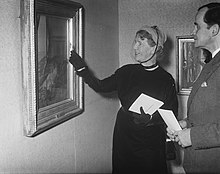James McNeill
This article needs additional citations for verification. (September 2019) |
James McNeill | |
|---|---|
 | |
| 2nd Governor-General of the Irish Free State | |
| In office 1 February 1928 – 1 November 1932 | |
| Monarch | George V |
| Preceded by | Tim Healy |
| Succeeded by | Domhnall Ua Buachalla |
| Personal details | |
| Born | Timothy James McNeill 27 March 1869 Glenarm, County Antrim, Ireland |
| Died | 12 December 1938 (aged 69) London, England |
| Spouse | Josephine Ahearne |
James McNeill (27 March 1869 – 12 December 1938) was an Irish colonial administrator, politician, and diplomat, who served as first High Commissioner to London and second Governor-General of the Irish Free State.
Early life
[edit]One of five children born to Archibald McNeill, a Roman Catholic working class "baker, sailor and merchant", and his wife, Rosetta (née McAuley) McNeill, James was the brother of nationalist leader Eoin MacNeill. James McNeill served as a high-ranking member of the Indian Civil Service in Calcutta.
Public life
[edit]Although unconnected with the Easter Rising in 1916, McNeill was arrested and jailed by the British Dublin Castle administration.[citation needed] On release, he was elected to Dublin County Council, becoming its chairman. He served as a member of the committee under Michael Collins, the chairman of the Provisional Government, that drafted the Constitution of the Irish Free State.[1] He was subsequently appointed as High Commissioner from the Irish Free State to the United Kingdom.
Governor-General
[edit]When the first Governor-General of the Irish Free State, Tim Healy, retired in December 1927, James McNeill was proposed as his replacement by the Irish government of W. T. Cosgrave and duly appointed by King George V as Governor-General of the Irish Free State.[citation needed]

In office, McNeill clashed with the King's Private Secretary when he insisted on following the constitutional advice of his Irish ministers, rather than that of Buckingham Palace, in procedures relating to the receipt of Letters of Credence accrediting ambassadors to the King in Ireland. He also refused to attend ceremonies in Trinity College, Dublin, when some elements in the college tried to ensure that the old British national anthem God Save the King was played, rather than the new Irish anthem, Amhrán na bhFiann.[2]
When Éamon de Valera was nominated as President of the Executive Council in 1932, McNeill opted to travel to Leinster House, the parliament buildings, to appoint de Valera, rather than to require that he go to the Viceregal Lodge, the Governor-General's residence and the former seat of British Lords Lieutenant, to avoid embarrassing de Valera, who was a republican.[citation needed]

However, McNeill's tact was not reciprocated by de Valera's government, and some of its ministers sought to humiliate McNeill as the King's representative by withdrawing the Irish Army's band from playing at functions he attended and demanding he withdraw invitations to visitors to meet him. In one notorious incident in April, two ministers, Seán T. O'Kelly (a future President of Ireland) and Frank Aiken, publicly walked out of a diplomatic function when McNeill, there as the guest of the French ambassador, arrived.[3] In a fury, McNeill wrote to de Valera demanding an apology for this treatment. When none was forthcoming, apart from an ambiguous message from de Valera that could be interpreted as partially blaming McNeill for attending functions at which ministers would be present, he published his correspondence with de Valera, even though de Valera had formally advised him not to do so. De Valera then demanded that George V dismiss McNeill.[1]
The King engineered a compromise, whereby de Valera withdrew his dismissal request and McNeill, who was due to retire at the end of 1932, would push forward his retirement date by a month or so. McNeill, at the King's request, resigned on 1 November 1932.[1]
In June 1932, John Charles McQuaid, President of Blackrock College, hosted an extravagant garden party to welcome Papal Legate Cardinal Lorenzo Lauri, who had arrived in Ireland to represent Pope Pius XI at the 31st International Eucharistic Congress. While De Valera maintained a very high profile at the event, McQuaid (at de Valera's request) went to great lengths to avoid McNeill to the extent possible.[4]
Death
[edit]
James McNeill died in 1938 at the age of 69 in London. His widow Josephine was appointed Minister to the Hague by Seán MacBride, Minister for External Affairs in the coalition government of 1948.[citation needed] He is buried in Kilbarrack Cemetery.[5]
References
[edit]- ^ a b c ""Demonstration of Independence", Irish Examiner, October 17, 2011". Archived from the original on 16 February 2020. Retrieved 15 June 2017.
- ^ State, Nation and Music in Independent Ireland, 1922-51 Archived 31 August 2021 at the Wayback Machine, Karol Anne Mullaney-Dignan, PhD thesis, National University of Ireland Maynooth, 2008, page 37
- ^ "Letter from James McNeill to Eamon de Valera (Dublin)", Documents on Irish Foreign Policy
- ^ "O'Dwyer, Rory. "On show to the world: the Eucharistic Congress, 1932", History Ireland, Issue 6 (Nov/Dec 2007), Volume 15". Archived from the original on 15 February 2020. Retrieved 15 February 2020.
- ^ "[Group of people standing beside a grave covered with wreaths, possibly the funeral of James McNeill at Kilbarrack Cemetery, Dublin". National Library of Ireland.

